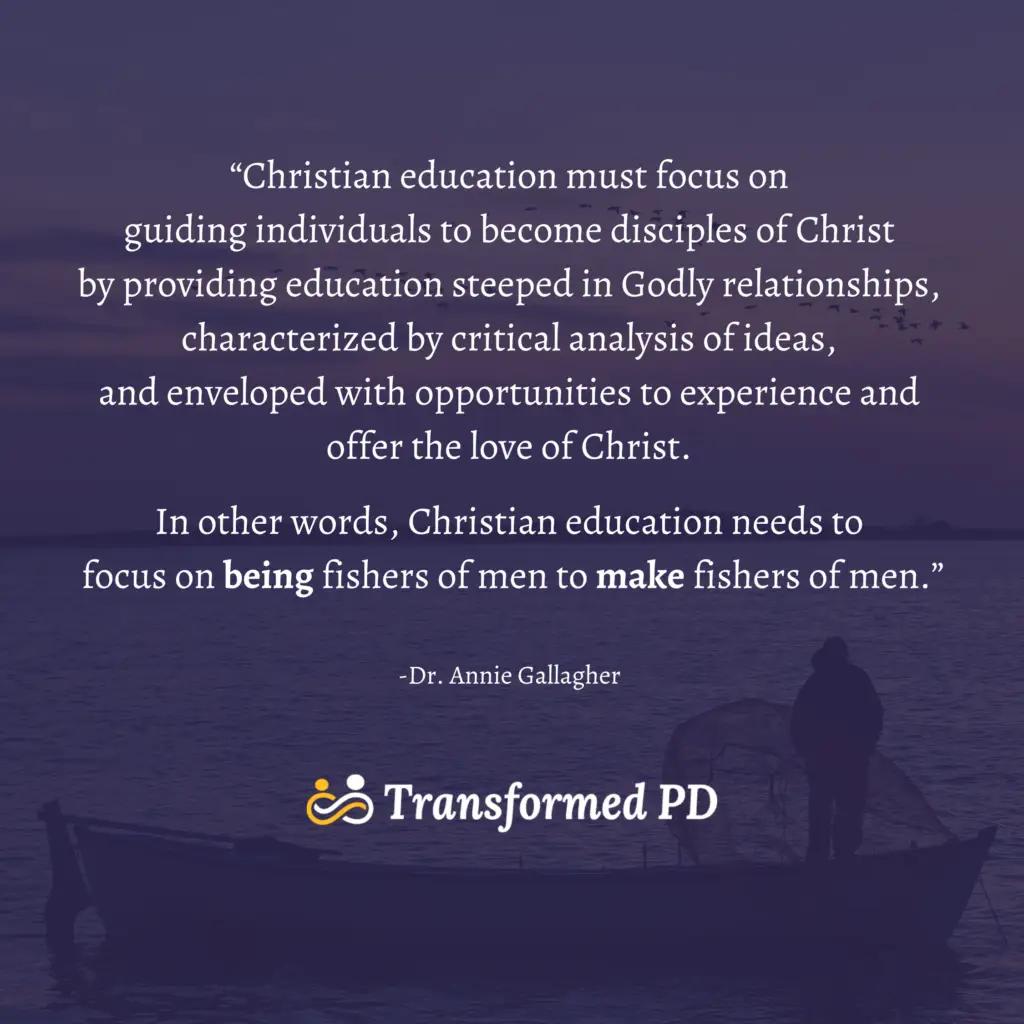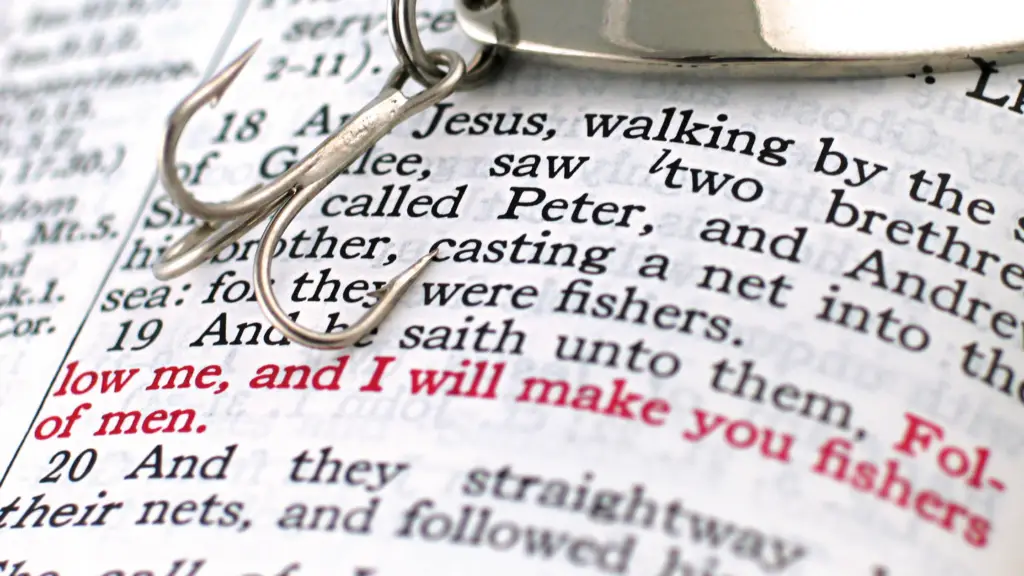When I first was hired as a Christian school teacher after teaching in public school, I was so excited. I could teach. I could pray with my students. I could read the Bible out loud with them. What a great experience it would be!
I was a relatively new Christian, so I was excited to be part of the family of Jesus, but I had so much to learn about Christian education. I saw teaching, praying, and reading the Bible as three distinctly separate things. Christian education is so much more than being able to pray with students and read the Bible aloud with them. Christian education is a way of teaching and a culture of learning.
The Ultimate Goal of Christian Education
For many the ultimate goal of education is to get a good job or to get into a good college. For others, the ultimate goal is to lead kids to Jesus. However, when we look at Scripture there is a bigger goal set for all of us as Christians, to develop fishers of Men.
In Mark 1:16-20, We are told that Jesus was walking by the Sea of Galilee, where there would be many fishermen. He saw the fisherman brothers, Simon and Andrew casting a net into the sea. Jesus said to them, “Follow Me, and I will make you become fishers of men”, as recorded in Mark 1:17 and Matthew 4:19. He walked on a little further and saw two more fishermen, James and John. They too were called.
Jesus’ invitation, “Follow me”, exposes the path of spiritual growth. David Guzik (2022) points out that in New Testament times, the phrase “to follow” implied a teacher-disciple relationship. By his invitation, Jesus was saying, “Learn from me as we spend time together.” The application for us is that we must become a learner as part of our relationship with Christ.
Jesus further emphasized that he would be the one doing the work to make his followers become catchers of men and women who would also follow Him. Jesus said, “I will make you become fishers of men.” This part of the scripture also points out that our spiritual development will take time and is a process. The result is that we will begin inviting others to follow Jesus who, in turn, also will become fishers of men.
We are all Fishers of Men
As believers, we all are responsible for being fishers of Men. The fisherman’s role is not just for some. Charles Spurgeon says it this way, “If you are saved yourself, the work is but half done until you are employed to bring others to Christ.” We too, as fishers of Men, need to cast the gospel message out to people and patiently wait to see if the catch is successful. The Holy Spirit is the person who works on the hearts of others, yet we are to cast the net by sharing the Gospel with others.
Now fast forward to three years later to the end of his earthly ministry, Jesus renews the assignment. He commissions the apostles to perpetuate the fishing expedition. Before his ascension he commands, “Go therefore and make disciples of all the nations, baptizing them in the name of the Father and the Son and the Holy Spirit, teaching them to observe all that I commanded you; and lo, I am with you always, even to the end of the age”, as recorded in Matthew 28:19-20.
Being fishers of men is a two-part process. The first step: catch men and women with the Gospel message and baptize them. The second step: teach them.
The disciples, these fishers of men, were sent to spill their lives out for others as a way to cast the net of the good news with their lives and their lips. That’s part one of the commission. The second part is teaching others to obey. The teaching part involves continual training that takes place throughout one’s life while a person increasingly develops a deeper relationship with Jesus and learns to obey everything Jesus has commanded.
Being Fishers of Men and Making Fishers of Men
So, what does this have to do with Christian education? Christian education provides the right opportunity to share the Gospel with others in our school community to influence them toward following Jesus as a disciple. That’s part one. Part two is to influence others in the school community to be fishers of Men through a spiritual growth process.
All experiences for a child from preschool through twelfth grade need to be couched in relationship and contribute to the knowledge, attitude, and skills needed to make disciples after surrendering to Jesus as Lord. As Dr. Glen Schulz from Kingdom Education Ministries puts it, every Christian school “must have as its primary goals the salvation and discipleship of the next generation” (Glen Schultz, 2021, p. 28).
How do Christian educators, whether teachers in a brick-and-mortar school, an online school, or a homeschool participate in the primary mission of education, making disciples? How do we navigate through the state requirements, curriculum content, and student extracurricular interests, while striving to simultaneously keep salvation and discipleship as the primary goal? It begins by understanding and committing to the truth that biblical education is not an added feature of secular education. Rather biblical education is a way of educating and a culture in which education takes place.
Making disciples is a process that cannot be planned with a scheduled end date. The Holy Spirit is the person who does the work of changing hearts to accept the invitation of salvation and surrender one’s life to the Lordship of Christ. However, we can help to prepare the way for Christ to enter someone’s heart and to participate in the disciple-making process.
Therefore, Christian education should incorporate a way of educating and a culture that intentionally sets out to influence biblical worldview development and spiritual formation. Thinking opportunities, relationships, and actions are strong worldview and spiritual formation shaping and influencing dimensions. So, it makes sense for Christian schools to promote opportunities for students to think critically about worldview ideas, build relationships with other Christ followers, and participate in experiences that provide guidelines and examples of Christ-like living and draw them into a saving relationship with Jesus.
Being a Fisher of Men in Your Classroom
As you journey farther into the first nine weeks of this new school year and prepare your weekly lesson plans, consider how you can purposely develop fishers of men. How are your relationships modeling the God of truth and grace? How can you get your students to think biblically about every subject? What opportunities are you creating for your students to live out and encounter the love of Christ?
Christian education is a holistic process that encompasses more than meeting curricular standards, providing excellent academic programs, offering a variety of extracurricular options, and multiple efforts with community outreach. Christian education must focus on guiding individuals to become disciples of Christ by providing education steeped in Godly relationships, characterized by critical analysis of ideas, and enveloped with opportunities to experience and offer the love of Christ. In other words, Christian education needs to focus on being fishers of men to make fishers of men.

Transformed PD and Christian Education
The mission of Transformed PD is to nurture the thinking and expertise of Christian school educators through relational teaching. We offer biblical professional development services and train educators on best practices to be fishers of men and make fishers of men. Contact us to learn more about partnering with your school. Stay up to date with all that Transformed PD is doing by subscribing to our monthly newsletter!
References
Guzik, D. (6/2022). Study Guide for Mark 1 by David Guzik. Retrieved from https://www.blueletterbible.org/comm/guzik_david/study-guide/mark/mark-1.cfm
Schutz, G. (2021) Kingdom education: God’s plan for educating future generations. Wheaton Press: Wheaton, IL.
Spurgeon, C. (18 Apr, 2001). How to Become Fishers of Men by C. H. Spurgeon. Retrieved from https://www.blueletterbible.org/Comm/spurgeon_charles/sermons/1906.cfm



2 Responses
Thanks for the write up. God richly bless you
Thank you, Ms. Henrietta, for the blessing.